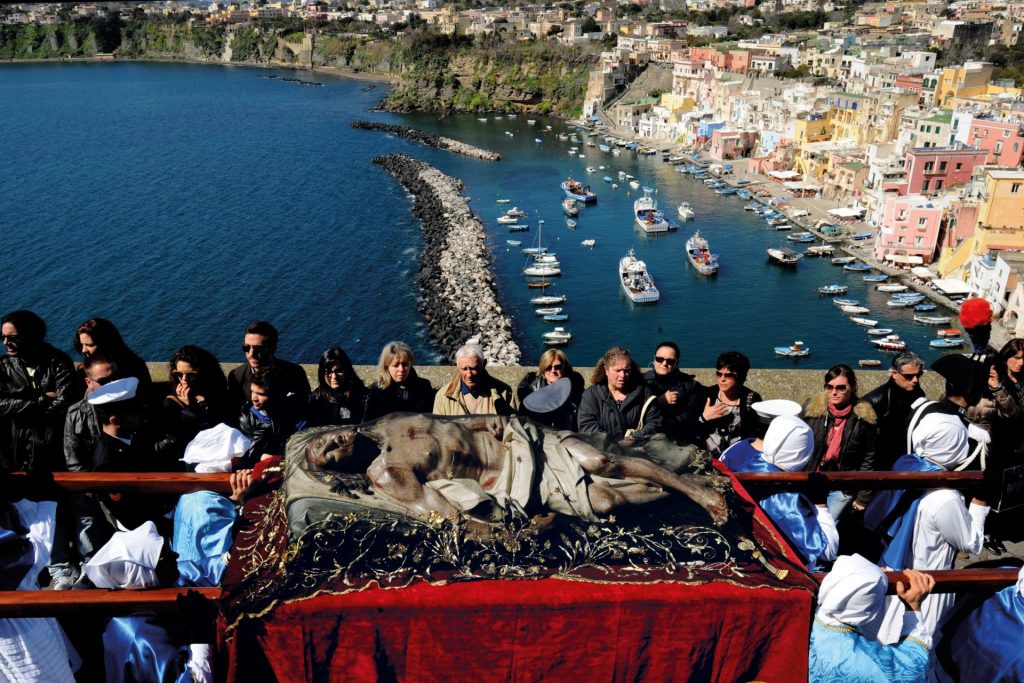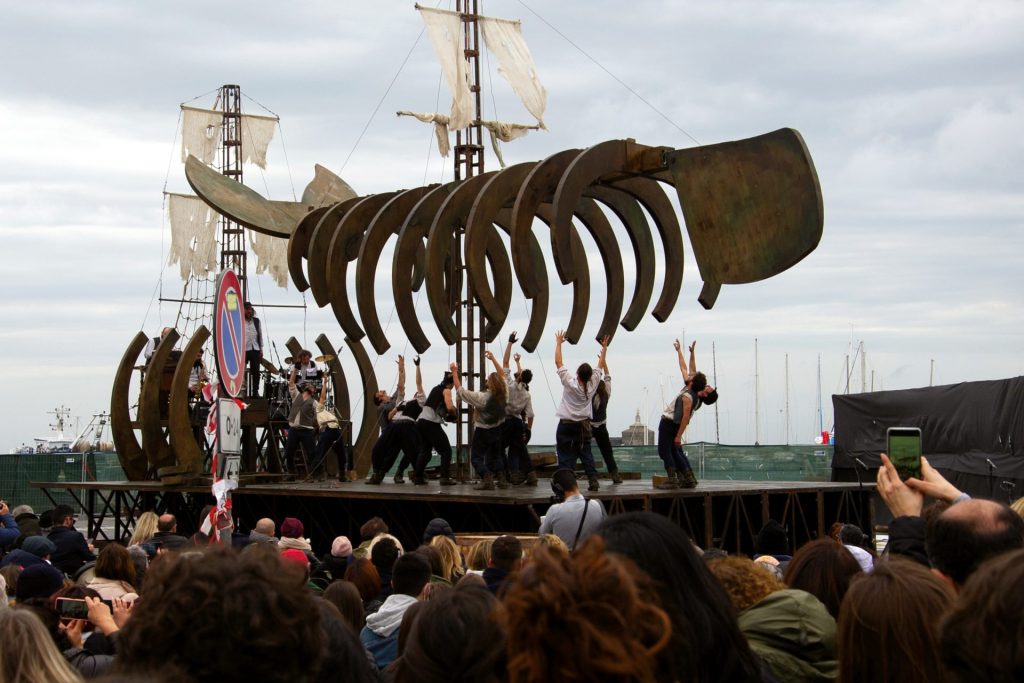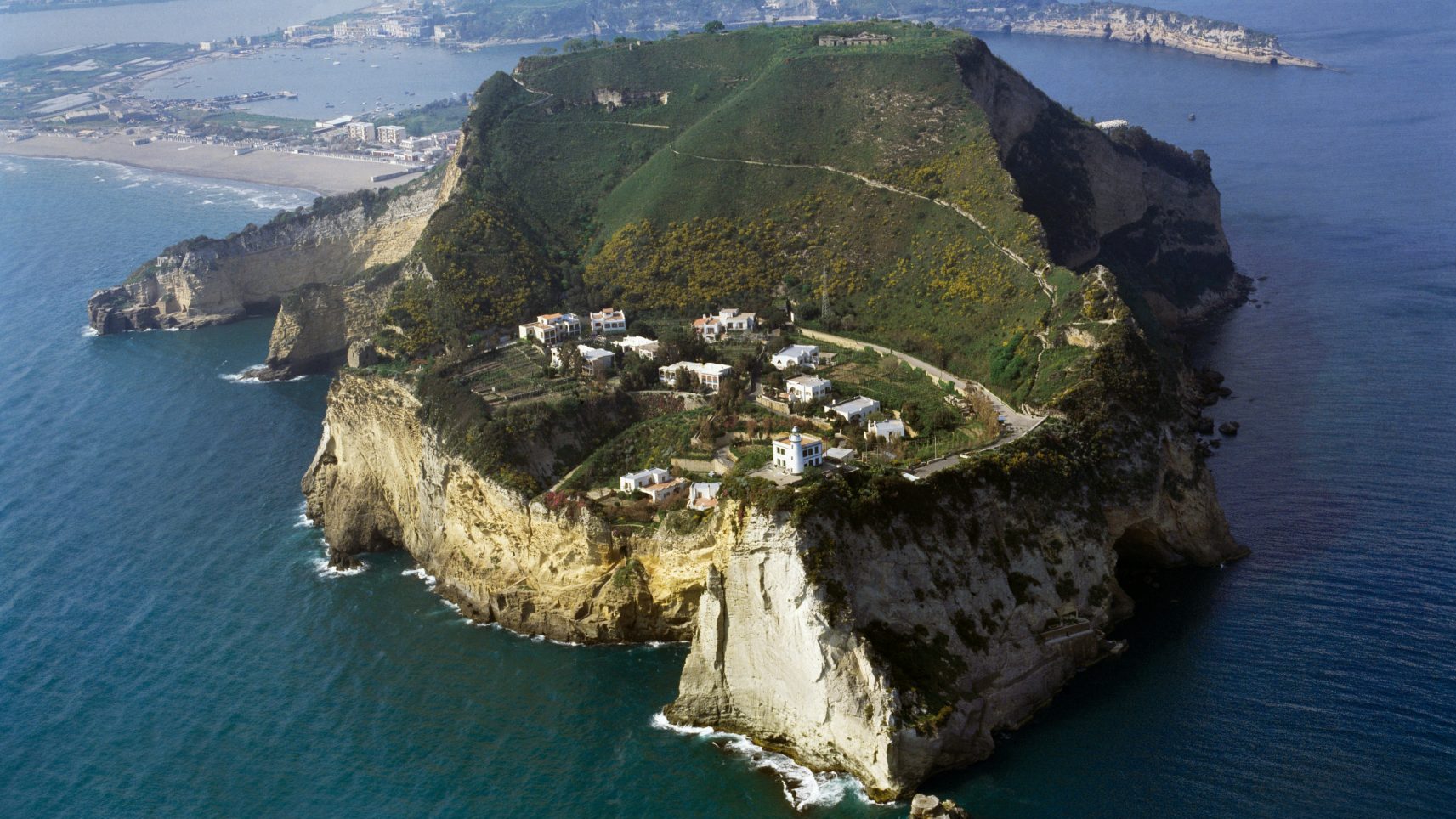How to improve on Utopia? Actually, why would you want to try? Those are the questions facing the Italian island of Procida, as its year as Italy’s Capital
of Culture 2022 gets under way.
It is certainly not a typical contender. Just over four square kilometres, Procida is picture-postcard perfect, with houses in a medley of primary colours stacked high above the Bay of Naples, busy ports where fishing boats bob, narrow cobbled lanes and quayside restaurants filled at the weekends with visitors treating themselves to fish fresh from the bay.
It is hard to get a handle on the aspirations of the organisers, who have been awarded millions of euros by the EU, the regional government of Campania and by several commercial sponsors. In fact, so chary are the organisers to share information it feels like a private event. Perhaps that is because, unlike its better-known neighbours, Ischia and Capri, it is unused to the limelight, emerging briefly into the public gaze when the film The Talented Mr Ripley was filmed there. Even the beach where a melancholy Pablo Neruda strolled in Il Postino has done little to capitalise on its fame, with only one very basic snack bar gracing its gritty grey beach.
Invariably, the condition for winning the prize is the need for regeneration. In Britain, Glasgow and Liverpool, which were European Capitals of Culture, and Hull, which was the UK winner, are obvious examples of post-industrial decline. Kaunas in Lithuania, highlighted in this paper as this year’s European Capital, has suffered from neglect and the exodus of its young seeking work abroad.
In Italy, Matera in the deprived region of Basilicata won the honour in 2019, while Procida’s rivals for the title in 2021 (the date was pushed on to 2022 because of the pandemic) included Bari, L’Aquila (wrecked by earthquake in 2009), Taranto and Trapani, which were all cities in need of revival. Next year, Bergamo and Brescia, which were painfully afflicted by the pandemic, take the crown.

The EU points out that not only does the winner receive a substantial cash injection – in Procida’s case at least €4.15m (£3.5m) – the year can help lift the GDP of a region by 4.5% as well as raising its profile and attracting tourists and business for years to come.
But having spent time on the island, there is no obvious need of regeneration, no bleak areas of neglect, no apparent poverty, and as for an increase in tourism, the 10,000 inhabitants are keen to keep themselves to themselves.
What makes the island different from Ischia and Capri is that Procida does not need tourists as a primary money-earner. Most of the men are seafarers, working on ferries and cruise liners but above all as fishermen. So successful are they that they even “export” their catch to the other islands and the mainland.
Yet the inevitable publicity will bring the crowds. The organisers are reluctant to share their plans, but 44 projects are envisaged over 330 days involving 240 artists and eight rejuvenated venues such as the 16th-century Palazzo d’Avalos, which was used as a prison in the 20th century and looms gloomily over the island. It will be dusted down and used for a photography exhibition and a showing of the work of Italian-Argentine artist Lucio Fontana, famous for his slashed and punctured canvases.
In May musicians from islands such as Taiwan, Mauritius, Madagascar,
Tahiti and Papua New Guinea will stage performances that chime with the event’s slogan, Culture is not an island, and at the end of April, a paper boat nine metres long will set sail across the bay accompanied by a fleet of origami boats to raise awareness of the fragility of the environment. Literary and performing festivals are planned but yet to be announced.
One Italian commentator argued that what could be worse than failure is,
paradoxically, success: if the success isn’t properly governed, it would be worse than failing. Another, writing in the regional newspaper Il Mattino, warned: “Beauty always ends up in the hands of the rich sooner or later.”
And that’s part of the challenge. How to keep the balance between an island for the islanders without being overrun by hordes of day trippers from the cruise ships that dock in Naples and holidaymakers from Germany and France, Rome and Milan and, maybe more significantly, how to stop the place becoming a magnet for second homeowners. According to property experts, prices are expected to rise by €20,000-€30,000 from the current average of about €250,000 to €260,000.
Painter and restorer Giuseppe Lubrano-Lavadera captures the pride the islanders have in the place. He made an ambitious float for the annual Rite of the Mysteries – a charming, often moving, procession telling the Bible story that wends its way through the island every Good Friday and reflects what he feels are the deep roots of tradition that unites the community, young and old.
“It’s more important than football,” he says. “We don’t need a museum but we do have streets.”
Emotion, faith, tradition – that has been at the heart of Procida for centuries and, while Giuseppe embraces the year of culture as an event that brings “possibility, joy and future prosperity”, he is just as adamant that it will not change the character of the island.

Italian Capital of Culture 2022 (Photo: Vincenzo Izzo/LightRocket)
Project deputy Giulia Pannozzoagrees. “If there are too many tourists that will be a problem for Procida. They really don’t like tourists and worry over growth in the likes of Airbnb but they understand that it does bring economic opportunities. You have young people who will have new perspectives, but they do not want to change what they are. This is their home.
“The people here don’t rely for work on tourists, they work with ships, with the fishing and the navy. The naval college is one of the oldest in Italy. They have to live with tourism but, unlike Capri, there is no mass tourism industry, the place does not turn on in summer and turn off in winter, it is lived in by the islanders 365 days a year.”
Pannozzo hopes that the year will open the island to the world with better ferries, and investment to improve the housing stock, restoring, say, a decaying palazzo and cleaning the beaches. There is talk of new pedestrianised streets and “green” areas while transport around the island has been improved with a fleet of mini buses, delightfully decked out in pastel blue and pink, which are free to use.
She is adamant that there will not be hotels springing up along the bays, nor will the quayside pescheria, where fishmongers prepare fish for sale, be replaced by cafés. “Not here,” says Pannozzo. “The people don’t want it
and they won’t let it happen.”
The insistence by the locals to have a say about the nature of the year’s offer is recognised by the project’s cultural manager, Agostino Riitano, who refers to himself as a “craftsman of the imagination” and insists that the project relies on the participation of citizens, “a collective lesson”, based on the character of the community, not a top-down project.
Riitano cites his success as manager of the Matera bid, in which he claims
the cultural and creative sector grew by 7%, compared with the national figure of 4.9%, start-ups rose by 18% and there was a boost to the economy
thanks to a 7.6% increase in tourism. But according to People, Place and Policy, an independent forum for debate on the challenges faced by contemporary society, while it is true that the ancient cave dwellings in the Unesco World Heritage site of Sassi di Matera have been restored, many traditional dwellers have abandoned their homes, which are being replaced
by hotels, B&Bs, souvenir shops and restaurants. The forum concluded that the abandonment of the historical city has helped to undermine the identity of the place.
This is the risk facing Procida and one understood by Michele Spinelli, owner of the quayside restaurant Pagnotta in the port of Marina Grande. He has seen how tourism has been encouraged and grown over the past 10 years despite the fact that many locals were suspicious that visitors from such as Germany and France were, as he put it, polluting the place. He does not want to see the same mistakes made by Ischia and Capri, where people come for the day, have an ice cream and return to Naples.
But he says: “The year of culture is run by Procida people so hopefully they won’t be selling homes or land to outsiders and we can keep our identity.”
As he whizzes up a dish of deep-fried anchovies or fresh whitebait, it is
unlikely that Signor Spinelli spares a thought for Tom Ripley’s rumination in The Talented Mr Ripley: “Don’t you just take the past and put it in a room in a basement and lock the door and never go in there?”
Like it or not, the past has been unlocked. Despite the almost defiant talk of preserving the island’s integrity, one of the aims of the year is to create at least 25 new enterprises in the tourist sector, proof, if any were needed, that the past is now colliding with the commercial imperatives of the 21st century.
The fate of this utopia is hanging in the balance.




